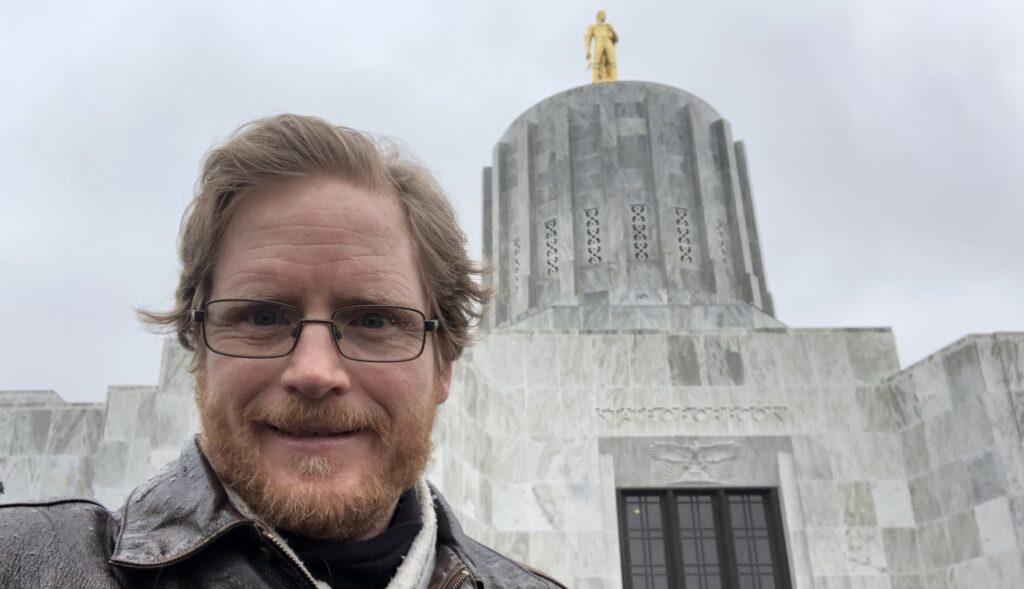
In the first half of 2021, I achieved one of my biggest successes in my 11 years as a climate organizer. As a volunteer with Citizens’ Climate Lobby (CCL), I led the efforts to engage with Oregon legislators and CCL volunteers around the state for the Oregon Legislature to almost pass a state wide climate change resolution. This CCL resolution nearly succeeded because of years working to understand the state legislative process for climate action, while consistently using the CCL core values when engaging with the Oregon Legislators.
Lobbying as a Renew Oregon Volunteer to urge Oregon Legislatures to pass a carbon pricing bill 2018-2020
In July 2018, Sonny Metha, Field Director at Renew Oregon at that time, invited me to join the weekly Clean Energy Jobs Grassroots call. These calls were part of the ongoing organizing by Renew Oregon, a coalition of businesses, non-profits, climate & environmental community organizations, and individual Oregonians, like me, working together to get the Oregon Legislature to pass effective climate change legislation. Renew Oregon focused on urging the Oregon Legislature to pass a state level carbon pricing bill, whcih was a cap and invest bill. This bill became known as the Clean Energy Jobs Bill or HB 2020 during the 2019 Oregon Legislative session.
Soon after I started volunteering for Renew Oregon, I became hooked on Oregon politics, organizing for climate action at the state level, and lobbying the Oregon Legislature. I loved every action I took to be involved with Renew Oregon’s efforts. I wrote letters to the editor and guest opinions in Oregon newspapers, contacting my state legislators by email and letters to support the Clean Energy Jobs Bill, lobbying my state legislators at their offices at the Salem Capitol and meeting with them in district, attending legislative hearings about the Clean Energy Jobs Bill, and giving oral testimony at legislative hearings.
My own state Representative at that time was Diego Hernandez . He liked to post constituent letters on his office bulletin board. I wrote so many letters to him that pointed to his bulletin board during a February 2019 lobby meeting. He wanted to let me know that he had kept all my letters and they dominated his bulletin board.
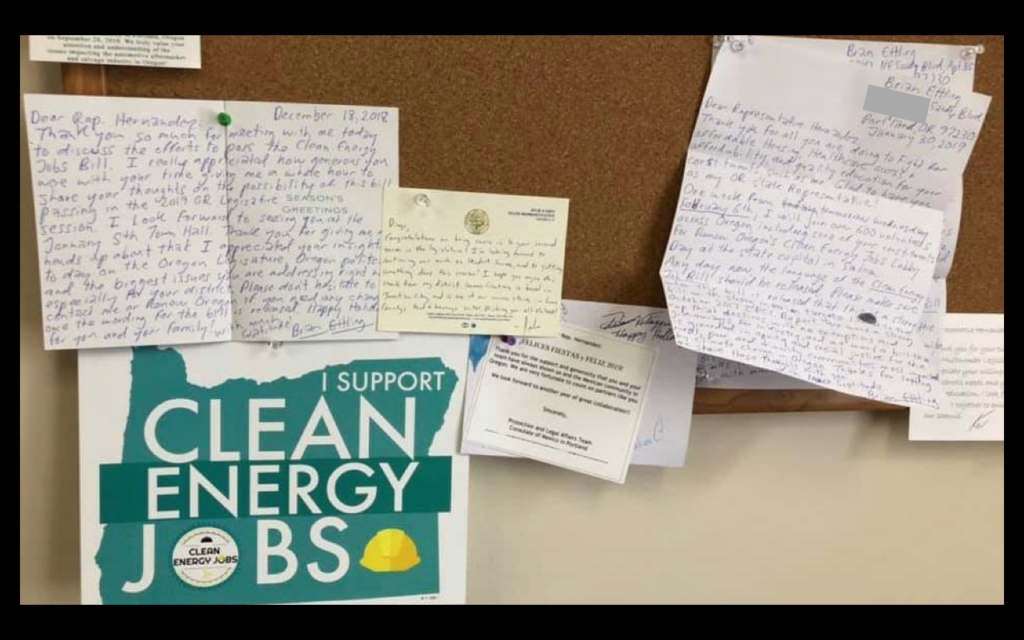
With my involvement with CCL and The Climate Reality Project, I helped recruit numerous friends and volunteers from these groups to attend the massive Renew Oregon Lobby Day rallies in Salem in February 2019 and 2020.
Even more, I organized two events in Portland to support the Clean Energy Jobs Bill. The first one that I held in Milwaukie Oregon in September 2019 had over 80 people in attendance. The second event I held in January 2020 in Portland had around 100 people in attendance. The speakers at the second event was Oregon Senator Michael Dembrow and Representative Karin Power, who were the legislative leaders of the cap and invest bills. At each of these events, I encouraged participants to sign postcards to their legislators urging them to support the cap and invest bills. On my next trip to the Oregon Capitol, I then delivered over 50 constituent postcards that I would then divide up and personally deliver to the various offices of the Representatives and Senators. I lobbied so frequently at the Capitol that I got to develop a good rapport with a number of the legislators.
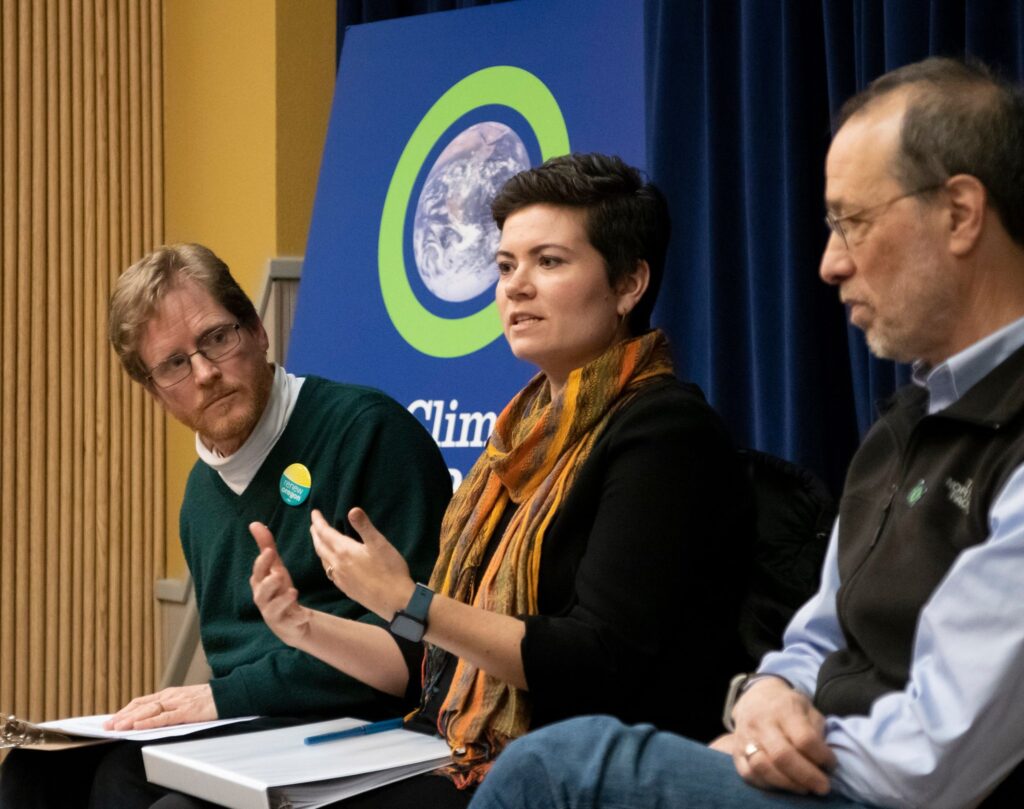
All of these actions build up to a pinnacle of excitement. I was in the Oregon House of Representatives gallery, along with so many of other Renew Oregon volunteers, to see The Clean Energy Jobs Bill pass by the Oregon House on a vote of 36 to 24 on June 17, 2019. Sadly, this all came crashing down on June 20, 2019. The Oregon Senate Republicans fled the state to deny the 2/3rds floor voting quorum for the Senate vote on the cap and invest bill. They stayed out of state until June 28th. Senate Democrats agreed to kill the climate bill in order to pass all their other remaining bills before the session ended on June 30th. It felt all my climate organizing in Oregon over the past year had gone down the drain. Through much of July 2019, I did not feel like getting off the couch to do anything. I felt so disheartened by the outcome.
Sadly, the cycle repeated itself during the 2020 Oregon Legislative session. Renew Oregon organized with Oregon Democratic Legislators to try to pass another cap and invest bill. This time, Oregon House and Senate Republicans fled the state to deny quorum for floor votes in either chamber in March 2020. This tactic worked again to run out the clock to kill the climate legislation before the 2020 session ended on March 6th. There was a small silver lining that Oregon Governor Kate Brown did sign strong climate executive orders on March 10, 2020. I attended the Governor’s signing ceremony at the Oregon state Capitol and I wrote a CCL blog about it afterwards, Oregon Governor Kate Brown signs strong climate executive order.
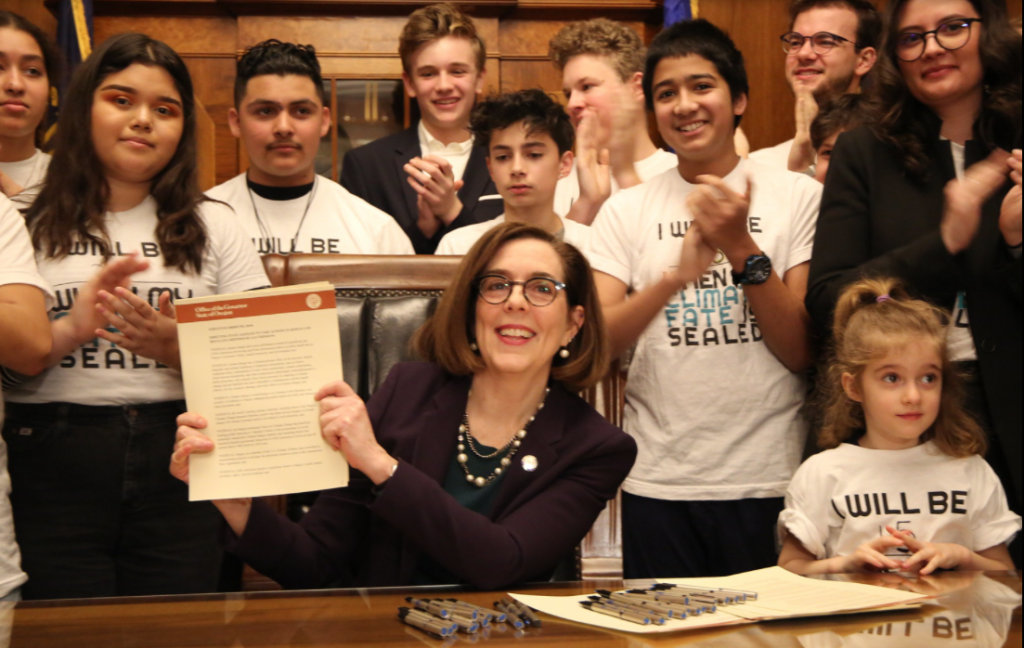
While Governor Kate Brown’s climate executive orders were helpful, I felt very depressed that all the hard work and organizing to pass a climate bill in Oregon proved futile with Republican legislative walkouts. The 2020 legislative defeat felt worse due to the beginning of the COVID pandemic. All climate organizing shut down for months since legislators were then strictly focused on the pandemic and the economic fallout. There was nothing to do but sit at home for several months to adhere to social distancing and to avoid catching COVID 19.
Leading the Effort to try to get the Oregon Legislature to work on a Climate Resolution
However, with my experience learning about the legislative process, I saw a way forward. During the summer of 2020, I started meeting by Zoom and phone with Oregon Legislators that I had met during my lobbying for the cap and invest bills in 2019 and 2020. As a Citizens’ Climate Lobby (CCL) volunteer, I urged them to endorse the federal carbon pricing bill supported by CCL, The Energy Innovation and Carbon Dividend Act (EICDA).
As I organized CCL volunteers across Oregon, we successfully urged over 30 Oregon legislators to endorse the EICDA by early 2021. As we met with the state legislators, they really liked the bipartisan market-based solution of the EICDA. Even more the CCL values of respect, appreciation and gratitude seemed to make very easy for many of these legislators to say yes to endorsing the EICDA.
September 17, 2020, I met Rep. Tiffiny Mitchell to ask her to endorse the EICDA. In addition to her endorsement, Tiffiny asked if she could introduce a statewide resolution supporting the bill. I was very excited that Rep. Mitchell was willing to devote time and energy to a possible resolution. She then instructed Oregon Legislative Counsel to draft a legislative resolution that was ready in December 2020.
I was very excited when the draft resolution language was complete in mid December 2020. To be honest, I was very disappointed with the response of the Oregon CCL Leadership. After I shared the news about the resolution, this was the response I received:
“This IS exciting!
I have to say though, it would be a lot more exciting to me if it were proposed as a bipartisan resolution.
I almost think that an only-D introduction and then vote of support could be harmful to our cause. (I could be convinced otherwise, but that’s where I am now)”
The response felt like huge letdown because I was thrilled that the Democratic legislators would want to even consider trying to pass a resolution for us. I tried to convey this in my response:
“Like Congress, the Oregon state Legislature is going to be swamped with legislative priorities such as COVID relief, economic assistance, racial justice & police reform, etc. Thus, we want to make this as easy as we can for them to pass this quickly while they are giving their lion’s share of attention to the huge issues I mentioned hammering the state and their constituents right now.”
My plan of action was to get the resolution started in the Oregon Legislature. Then we should try to see if we could get Republican co-sponsors and support. Over the next month, I was feeling very angry because one of the Oregon CCL Leaders kept saying: ‘If we don’t have any Republican support, I don’t think we should do this resolution.’
Fortunately, the national CCL staff backed up what I my efforts for the Oregon Resolution. In a group email that included Oregon CCL leaders, a staff person wrote: “Bipartisanship is always good but not a deal breaker. We’ll take what we can get! Oregon would be the first state to pass an EICDA resolution.”
Rep. Tiffiny Mitchell did not run for another term in the November 2020 election. Thus, she asked her friend Senator Michael Dembrow to be the Chief Sponsor. Senator Dembrow then asked me to come up with additional Legislative co-sponsors for SJM 5. Working with CCL volunteers across Oregon, I got 9 Oregon Democratic Legislators to agree to be co-sponsors, including 4 Senators and 5 Representatives.
The resolution was introduced on the Senate floor February 4, 2021, when it officially became known as Senate Joint Memorial 5 or SJM 5. The title specifically “Urges Congress to enact bipartisan climate change legislation.” Towards the end of the resolution text, it states: “we respectfully urge the Congress of the United States to pass, and the President to sign, the Energy Innovation and Carbon Dividend Act.”
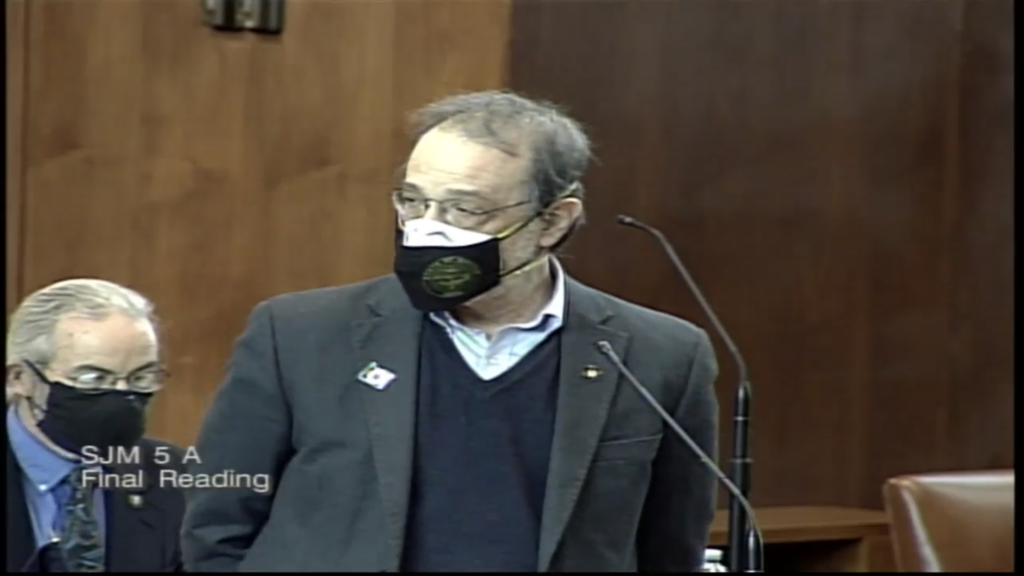
On February 10th, SJM 5 was assigned to the Senate Energy and Environment Committee for consideration. SJM 5 would be in good hands, since 3 out of 5 members of the committee had already endorsed the EICDA. Senator Dembrow’s staff then contacted me to organize 5 volunteers to give oral testimony supporting SJM 5 for a committee hearing scheduled on February 25th. Due to the committee hearings and work sessions for other bills and resolutions under consideration, the 5 volunteers I assembled finally had a chance to give their oral testimony on March 4, 2011.
Gaining bipartisan support to pass the Oregon Senate
With the successful introduction of SJM 5 in the Oregon Legislature, state coordinator Daniela Brod and other fellow Portland chapter members wanted to get Republican legislators on board, too. In November, they met with GOP House Minority Leader Christine Drazan to talk to her about climate action and putting a price on carbon. To their delight, she was very enthusiastic about the EICDA.
In her oral testimony before the Senate Energy & Environment Committee on February 25th, Republican Representative Drazan stated:
“The Energy Innovation and Carbon Dividend Act is not perfect, but it is an opportunity and we shouldn’t squander it. It is an opportunity for Congress to stop playing small ball on climate.”
Immediately after her testimony, a GOP member of the committee, Senator Lynn Findley, enthusiastically responded, “This is a great thing (and) a process that I fully support.”
On March 11th, Republican Senator Findley joined the 3 Democratic Senators on the Energy & Environment Committee to pass SJM 5 out of committee with a recommendation “to be adopted” by the full Oregon Senate..
For the rest of March and into April, I organized closely with CCL volunteers across Oregon to lobby nearly all the Oregon Senators, Democrats and Republicans, to support SJM 5. We had high confidence that we had the vote of GOP Senator Lynn Findley. However, we did not want to take any vote for granted, Democrat or Republican. Daniela and Oregon CCL volunteer Elizabeth Graser-Lindsey successfully got a meeting with GOP state Senator Bill Kennemer in early April 2021. On April 6th, he agreed to co-sponsor SJM 5 the day before the Senate vote.
SJM 5 passed the Oregon Senate on April 7th by a vote of 23 to 5, with 6 Republican Senators, half of the Oregon Republican Senate caucus, joined with all the Democratic Senators present to vote to support SJM 5. Senator Michael Dembrow gave an amazing floor speech to urge his fellow Senators to support SJM 5. For his floor speech, Senator Dembrow wore an Oregon Climate Reality Green Ring pin that I gave him one year earlier. It was a gift to thank him for speaking in the Climate Event I organized on January 21, 2020.
Of the 23 Senators who voted yes, I directly lobbied only 3 of them by email, phone calls, and personal texts. From engaging with friends across Oregon to ask them to contact their Senators, I indirectly succeeded with 17 Senators voting in favor of SJM 5. I played no role in 3 Senators voting in favor of SJM 5, including the affirmative votes of two GOP Senators. Thus, this was a team effort with the legislators, CCL volunteers and friends across Oregon, but I did play a major part in getting many of the Senate votes and legislative co-sponsors.
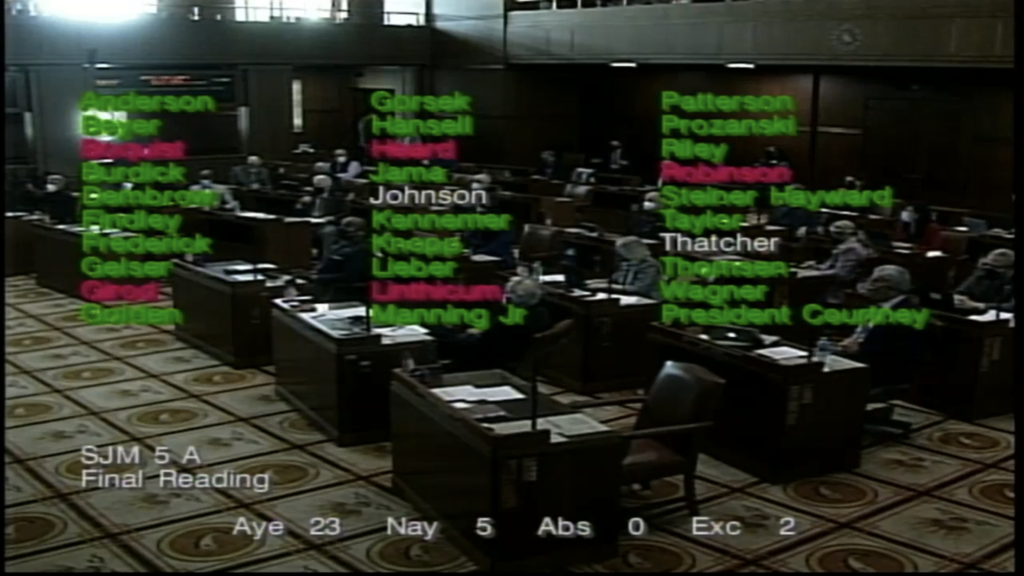
Falling short in the Oregon House
On April 8th, SJM 5 was introduced in the Oregon House. It was then referred to the House Rules Committee. To build support for SJM 5, I worked closely with Oregon CCL Leadership as well as CCL volunteers across Oregon engaged with their representatives. As a result, 30 House members, including 7 Republicans, endorsed SJM 5. The Oregon House has 60 members. Thus, half the chamber were co-sponsors of SJM 5.
For the first half of 2021, it was a full time effort for me to build as much legislative support as possible for SJM 5. Of the 39 legislator co-sponsors for SJM 5, I was directly involved in meetings, phone calls, and emails with these legislators or their staffs to persuade 17 to sponsor SJM 5, including three Republicans. From engaging with friends across Oregon to ask them to contact their legislators, I indirectly succeeded in getting 16 legislators to endorse SJM 5. 6 legislators signed up to be co-sponsors, including 5 Republicans, without any interaction from me.
The Oregon House proved to be a tougher beast for us to navigate. We did not have a champion to guide SJM 5 through the Oregon House, like we had with Chief Sponsor Senator Dembrow to guide it through the Senate. Even though House Minority Leader Christine Drazan gave strong supportive oral testimony on SJM 5 to the Senate Energy and Environment Committee on February 25th, she did not seem interested in guiding it through the Oregon House. She seemed hesitant to co-sponsor to put her name officially on the resolution. I could sense that she needed some support within her GOP House caucus for SJM 5 before she was willing to publicly support it.
On March 12th, I was able to get a meeting with former Oregon Secretary of State Bill Bradbury and his GOP Rep. David Brock Smith. It took a little coaxing in this meeting, but Rep. David Brock Smith did say yes to co-sponsoring SJM 5. This was actually our first GOP House co-sponsor. Then, when Christine Drazan was starting to see that some of her caucus members were starting to sign on to co-sponsor SJM 5, she co-sponsored it. Thus, I actually got the first Republican House co-sponsor for SJM 5. This was a team effort since other Portland CCL volunteers had a meeting with Rep. David Brock Smith the previous autumn. They laid the groundwork for my successful meeting with David Brock Smith.
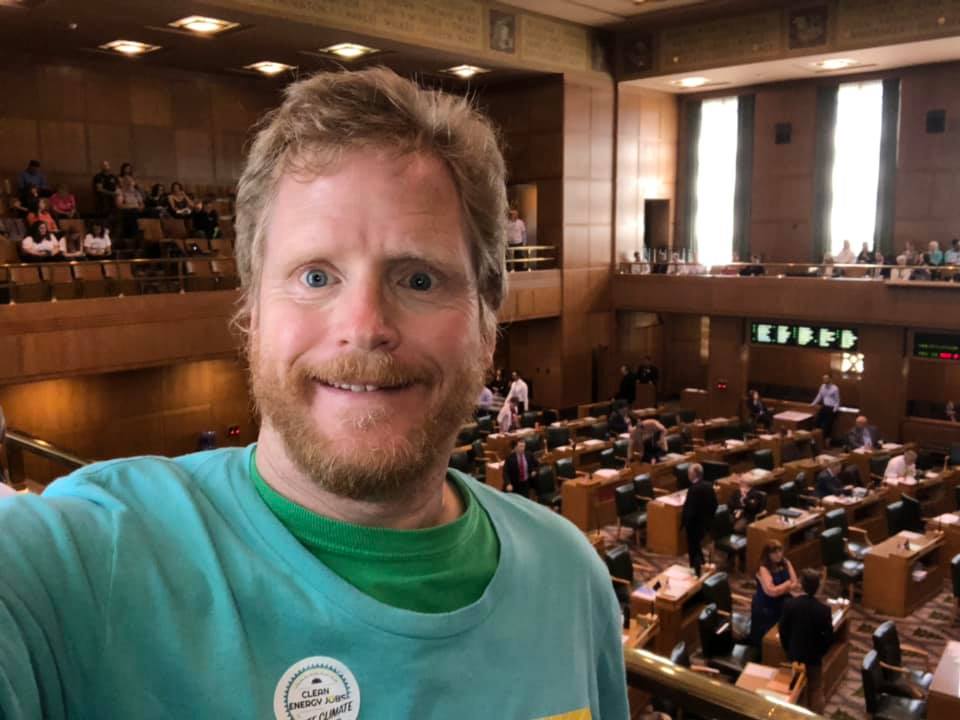
Sadly, on Wednesday, June 9th, a state Representative called me to share the bad news with me. He informed me that House Democratic Leadership was not going to allow SJM 5 to have a vote in the Rules Committee or on the House floor before the 2021 Legislative session ended on Saturday, June 26th. Ironically, they considered SJM 5 to be ‘too bipartisan.’ They were worried that if they allowed SJM 5 to pass, it could give Republicans in the legislature cover to tell their constituents that they were acting on climate by supporting SJM 5 while opposing climate policy bills supported by the Democrats. Sadly, the bitter rancor over the cap-and-trade bills from the previous legislative sessions had spilled over to doom SJM 5 from passing the Oregon House.
My Final Thoughts and advice to organize for a state legislature to pass a carbon pricing resolution
As the Lead Organizer of SJM 5, the big lesson we learned was that we needed a stronger effort to build relationships to persuade the vital gatekeepers, such as the Speaker of the House and the House Majority Leader, that it was in their best interests to support passage of SJM 5. Getting bipartisan support was not enough.
There is another takeaway besides fully understanding the legislative process and trying to successfully engage the vital gatekeepers. It is crucial not to forget the CCL core values of respect, appreciation, gratitude, and motivated listening to the legislative priorities and complicated politics facing the key legislators that can stop or move a bill to passage. If they don’t feel like we are fully listening and supporting them, the chances are they will be less inclined to pass a CCL high priority bill.
Undoubtably, there can be hard feelings with CCL volunteers if a House Speaker, Majority Leader, or Senate President decides to kill a CCL high priority bill. It must be stressed not to take those decisions personally. Instead, it should be emphasized to try to positively maintain those relationships for the constructive next step.
For CCL members who feel a little intimidated or unsure how to approach Congressional offices, engaging with your state legislators can be a wonderful way to learn retail politics that can be used to then lobby your members of Congress. When I lobbied state legislators, especially legislators where I was not a constituent, I was amazed how much easier it was to access them and develop relationships with them.
Again, many state legislators work closely with members of Congress. Thus, developing positive relationships with state legislators so that they feel comfortable endorsing the EICDA or other CCL high priority bills can make a difference in shifting members of Congress to support CCL priorities.
When SJM 5 passed the Oregon Senate on April 7th, this was the first legislative resolution to pass through a state legislative chamber supporting the EICDA. I hope my action to lead Oregon CCL volunteers to nearly pass a state resolution in 2021 will inspire someone. My dream is that my efforts can provide a template for CCL volunteers in other U.S. states or even internationally to pass carbon pricing resolution through both chambers of a legislature in 2022 or beyond. Hopefully, passing a state carbon pricing resolution will then influence our members of Congress to pass federal carbon pricing legislation.

